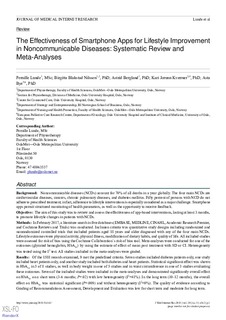| dc.description.abstract | Background: Noncommunicable diseases (NCDs) account for 70% of all deaths in a year globally. The four main NCDs are cardiovascular diseases, cancers, chronic pulmonary diseases, and diabetes mellitus. Fifty percent of persons with NCD do not adhere to prescribed treatment; in fact, adherence to lifestyle interventions is especially considered as a major challenge. Smartphone apps permit structured monitoring of health parameters, as well as the opportunity to receive feedback. Objective: The aim of this study was to review and assess the effectiveness of app-based interventions, lasting at least 3 months, to promote lifestyle changes in patients with NCDs. Methods: In February 2017, a literature search in five databases (EMBASE, MEDLINE, CINAHL, Academic Research Premier, and Cochrane Reviews and Trials) was conducted. Inclusion criteria was quantitative study designs including randomized and nonrandomized controlled trials that included patients aged 18 years and older diagnosed with any of the four main NCDs. Lifestyle outcomes were physical activity, physical fitness, modification of dietary habits, and quality of life. All included studies were assessed for risk of bias using the Cochrane Collaboration`s risk of bias tool. Meta-analyses were conducted for one of the outcomes (glycated hemoglobin, HbA1c) by using the estimate of effect of mean post treatment with SD or CI. Heterogeneity was tested using the I2 test. All studies included in the meta-analyses were graded. Results: Of the 1588 records examined, 9 met the predefined criteria. Seven studies included diabetes patients only, one study included heart patients only, and another study included both diabetes and heart patients. Statistical significant effect was shown in HbA1c in 5 of 8 studies, as well in body weight in one of 5 studies and in waist circumference in one of 3 studies evaluating these outcomes. Seven of the included studies were included in the meta-analyses and demonstrated significantly overall effect on HbA1c on a short term (3-6 months; P=.02) with low heterogeneity (I2=41%). In the long term (10-12 months), the overall effect on HbA1c was statistical significant (P=.009) and without heterogeneity (I2=0%). The quality of evidence according to Grading of Recommendations Assessment, Development and Evaluation was low for short term and moderate for long term. | nb_NO |

